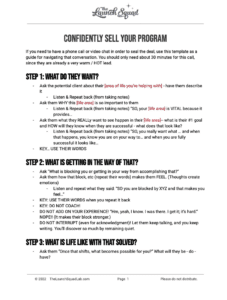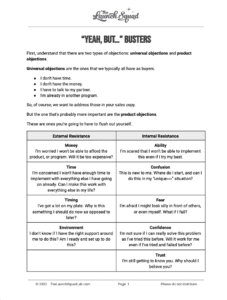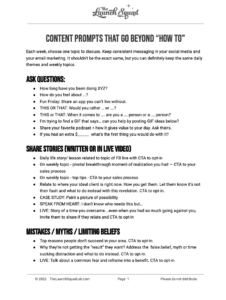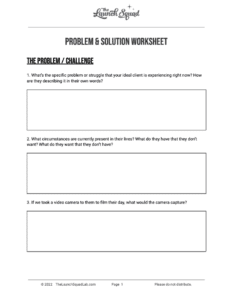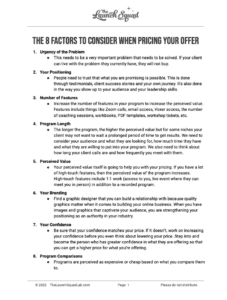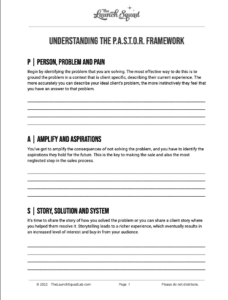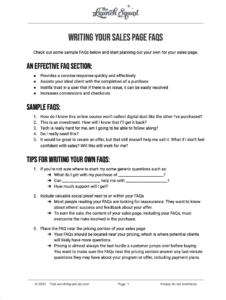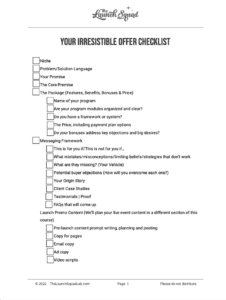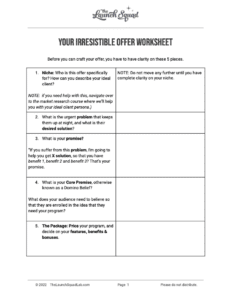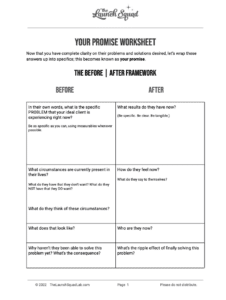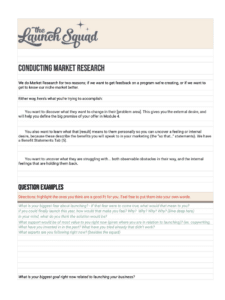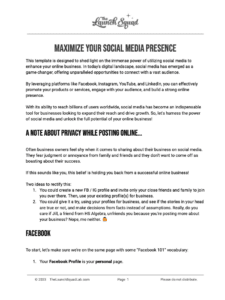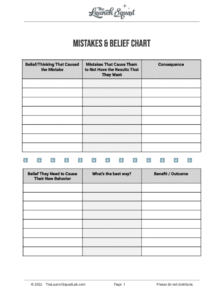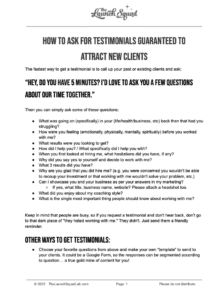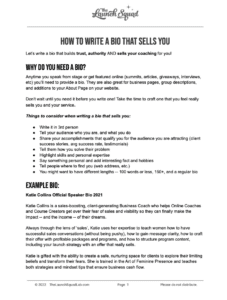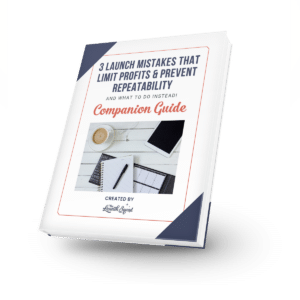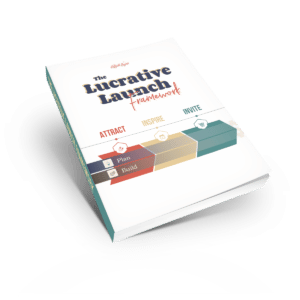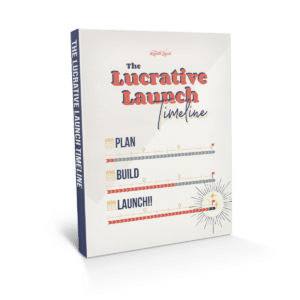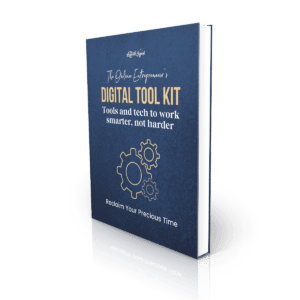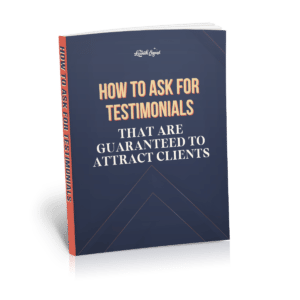[00:00:00] Jeffrey: Welcome to the Light in Your Launch podcast. Today we're talking about creating simplicity in your next digital launch. Stay tuned.
[00:00:55] Jeffrey: Welcome back to this show. I'm Jeffrey Samano. I'm back again with Katie Collins, and today we want to talk about how you can bring simplicity and leverage into your business and online launches.
Katie, who are we speaking with?
[00:01:11] Katie: She is a serial entrepreneur, online business manager and operations expert to six and seven figure visionaries, and she's also the host of the Crystal Vision Podcast. She is obsessed with taking the scary strategy of business and making it simple so that business owners can start making. Now she lives in Australia, and when she's not home with her family, she's off gallivanting in her camper van.
As an explorer and an adventurer, welcome to the podcast stage, Olivia
[00:01:46] Olivia: you for having me. I'm so excited. What an intro. Now I just have to like, take about. No, thank you guys. I'm very excited to be here and to, um, to chat with your audience all about launching, which oh my gosh, sometimes it makes us feel like, like you get like launching, but it can be simple.
It can be fun. So let's talk about.
[00:02:08] Jeffrey: Right. So tell us a little bit about how you started. How do you, how, how did you get here
[00:02:17] Olivia: yeah, sure. So, um, I started straight out of school actually. I did really well in high school. I, um, became a tutor and then they had an internal role going within the company to be an inquiries assistant. I thought, Oh yeah, I'll give it a go. Um, you know, good hours per week works in with my other staff and I just loved it.
I was obsessed with the CRM and calling up clients and having a work phone. Like I was just, I was so funny with all that sort of stuff, and I kind of realized in that role that I've always been more business minded or very, Strategic in a sense. The easiest way for me to explain it is from year seven, um, which is about 13, um, in Australia, um, we get school planners and no one used them.
And I did, I used my school planner every single day, and when I was 15, I bought a personal planner. So I had. School planner, Am I at home planner? Like I don't know how much a 15 year old has to do every day, but apparently I needed two. So I kind of realized, oh, I think this is definitely for me. I think this world is very interesting and exciting.
So, I stopped tutoring. I, um, learned as much as I could, became the inquiries manager, and then the executive manager was managing 200 employees and like a team of eight core staff. So it was pretty big staff. Um, and then I decided to take it a year off uni. Um, and try out my own businesses, which is why I have so much experience in this, because I tried everything.
I tried a business here and that one there. And okay, how can I like dial down? What do I like? What am I good at? Um, what works? And, um, finally sort of came back to doing I, like, I did a lot of visionary work starting up my own businesses and I just. Higher level stuff. I miss doing big picture strategy and working with people.
So I became an integrator, um, and changed my degree. So now I'm finishing it off studying business. I was originally in media and communications. Um, I, I fell into the personal development. Well joined Business by Design, by James Wedmore, which is how we met. Um, so yeah, that's kind of the linear, non-linear version of the journey.
[00:04:51] Jeffrey: That's awesome.
[00:04:52] Katie: that. All right. I have to say I too loved my planner. I just loved it and not only I used my planner at home to plan out my outfits that I was going to wear to high school month at a time. I planned out my outfits and I would have this personal rule of
[00:05:13] Olivia: I love that I had this personal rule. I was like, Why did that just speak to me so much? Yes. The all the little rules we have. Oh my goodness.
[00:05:25] Katie: Oh, so you know, because Jeffrey wears the same t-shirt every day.
[00:05:29] Jeffrey: Yeah. Yeah. I was like, Man, I can't go a week without repeating a few shorts or shirts or something. Like, I don't know how to do that. My closets is like this big
[00:05:39] Katie: I lucked out cuz I had a sister that was the same size, so I really had double the closets, right? We, we interchanged our clothes quite a bit, so, um, no, but I love, um, I think that's really important when you're, um, becoming a business owner. When you are a business owner and you're figuring out your pathway.
It's so important to start with, like what are the strengths I have, right? Not the strengths that other people tell you that you should have, but if you are like, I hate spreadsheets, I don't like organization, I don't like tech, then you know, please don't start a business that requires those things. Um, and a lot of times, you know, you can be in this supportive role instead of the front and center role and be just as needed.
And valued as the front and center person, right? Like, so I think for some people they're like, I don't really wanna be front and center. And I think Jeffrey often says that in this business relationship, he's like, I'll take the back seat,
[00:06:37] Jeffrey: Totally. I'm the, I'm the wizard behind the curtain.
[00:06:40] Katie: Yeah. Yeah. Um, so we've mentioned the word a couple of times, integrator, and that was a word I really just learned a couple years ago, so I'd love for you to share what exactly is that and who needs to hire
[00:06:52] Olivia: integrator. Um, it is from the entrepreneurial operating System, um, which is essentially just a, a book, a framework for running your business and it looks at, rather than having a CEO. And a COO for example. So you have your chief executive officer who does the big picture vision for the company, right?
We're all familiar with ceo. Um, and then you have what, you know, some people may not always know about cuz they are often a bit more behind the scenes is the COO or the chief operating officer. So it's the person who. Talks to the visionary and says, Yes, I love this big picture. I love what you wanna do Here, let's make it happen.
Let's dial it down. Let's take it week by week, step by step. So they really take that vision and they make it actionable, they make it doable, and they translate it into those steps for the company. . Um, in that sense you can, you know, use the word visionary and the word integrator. So visionary again in a business, big picture.
Um, they have, they have the vision, so they're usually a bit more flowy. They. Probably don't always love numbers or spending time in that sort of thing. Their time is better spent, um, using their minds to create the vision, to create what the company or what the business is going to do and achieve. And the integrator, again, same situation, comes in and says, Ooh, love that.
Let's make it happen. Um, let's, you know, they sort of, um, I don't know what the term is, but it's like they kind of round them in in a sense. They're like, Okay, yes, we're talking five years now. Can we just bring it back to one year? Like, what are we gonna do this year? What are we gonna do this week in order to make this vision happen?
So, um, the integrator spends a lot of time in strategy thinking about, you know, planning in the numbers, talking with the team, all that sort of stuff. What what it is, is a relationship that allows both people to be in their zones of genius. So trying to sit a visionary down and say, Hey. Plan out your launch.
Um, what tech do we need? How's it all gonna work together? The visionary is just like, I know exactly how many people are gonna come in. I know what I'm gonna talk about in the masterclass. Um, I know how people are gonna feel when they leave. The integrator's job is to take that and say, Yes, what does this actually look like?
Let me write it down. Let me, um, make sure that all the tasks are assigned. Let me get click up open. Like they're all about the process. So, yeah, I feel like, Does, does that feel clear enough? I know integrator not necessarily thrown around all the time. I feel like kind of using it, everyone's like, Oh, what does that mean?
And if they know what it means, they're like, Ah, I see, I see what you do.
[00:09:48] Jeffrey: I think that that is kind of a nebulous term, or maybe it's a new term for a lot of people. And you know, how, how does, how does an integrator differ from like a project manager or a team leader or,
[00:10:06] Katie: An online business manager.
[00:10:07] Jeffrey: Yeah, like I Is that, is
[00:10:10] Olivia: all the parts. So I think in order to be a really good integrator, you have to have an understanding of how to do project management. You have to have an understanding of how to do business management and lead the team. What I would say the difference is, When we're looking at an entrepreneurial business, right when it's first starting out, there's not a lot of people.
So it's not like we have the type of structure that we see in traditional businesses where, you know, they're making hundreds of millions of dollars a year, and it's like, yes, we have the the founder, and then we have the. The ceo, and then we have the COO, and we have the chief marketing officer and the chief technological officer, and then that's the, you know, C level or the exact team, and then it branches out into the team leaders of their teams, right?
We don't have that sort of structure. You might just be yourself in your business and think, Well, I'm doing everything, so am I a visionary or I'm an integrator? In the start, you're probably gonna have to be both, because you're gonna have. Have the vision and also actually implement it and put it into place.
So I think integrator encompasses all of those things just in the context of, um, an entrepreneurial business or a business that has less people. So they're, they're taking on a, a bit more of those roles. If there's like 500 people in, in a company, I don't know if you would just have an integrator. I think you would have, like I said, all those C levels, C level execs, they call it, um, all the chiefs, if you will.
So I think, I think that's the distinction, or that's how I have come to understand it. Um, in my time working with different businesses.
[00:11:49] Jeffrey: So if in your head or in your perspective, um, let, let's say somebody is a solo entrepreneur right now and they have a va, overseas VA or something. At what point is it at what, like, in your mind, I guess I'm trying to figure out how to ask this question. Is there like, when is it, when is the right way?
When is the right. For an integrator, is that the next hire they should be looking for? Do they work their way up with a manager position or a, um, you know what I mean? Like how, how, when, when is it right to bring an integrator in and how do you know
[00:12:30] Olivia: I think, um, We can go big picture first, and then I also have, um, thoughts around tangibles as well, like actual numbers that you should hit before you think about hiring an integrator. I think if the strategy staff, strategy staff, if it's starting to. Really bring you down. And you are, and we all do this, so it's okay.
You can admit if you are one of these people who are doing it right. Um, oh, I don't wanna sit down and do my work today because I really don't wanna deal with that. Okay. Like, it's like I really don't wanna like join Kajabi with, I mean, this is just. In the coaching world, but I don't wanna join this technology with that technology.
Like, please, I don't wanna open, click up or Zier today. I can't get my head around it. Or I need three shots of coffee before I can even open my computer. Because putting this technology together is driving me insane. I think it, when it's starting to impact the way that you
[00:13:31] Jeffrey: Right.
[00:13:31] Olivia: think when it's starting to.
[00:13:33] Jeffrey: my ears
[00:13:33] Olivia: The work that you do and, and the way that you show up for your clients and for your audience. I think it's time to think about it. Um, or start to, you know, and if you're a visionary and you're thinking like this, then envision what an integrator would look like for your business. Bring that, start thinking about what that vision would look like coming to.
Um, in terms of having a, a va, obviously you have to manage them and this is also the part that kind of makes it difficult for visionaries. I see a lot of visionaries struggling to get their businesses off the ground because they simply can't do the strategy, they can't get their head around doing it and business.
Both. It requires the vision and it requires us being strategic, looking at our numbers, getting our shit together and just making it happen. Right? So I think when we have that strategy stuff, I can't think of a better word other than stuff cuz it's just, it's just so much. But when we have that strategy, um,
[00:14:37] Jeffrey: It's, it is the tech stuff, right? It's largely the tech stuff and the, and the nitty gritty, the web stuff, the forms, the Zapier, the integrations, the crm and all of the stuff. You're, you're clicking and stuff with the keyboard, Like that's, that's
[00:14:54] Olivia: And yeah, it can feel super overwhelming for someone who has come into the business world thinking, I just really wanna help people. Um, so when you have a va, you have to.
[00:15:07] Jeffrey: Yeah.
[00:15:08] Olivia: Get your head around it enough to actually give them the task. So what an integrator, I think really does sometimes in the beginning is they come in and they help the visionary over time realize that they don't have to do all the thinking anymore.
It's like they can just sit in their zone of genius. They can just sit in the vision and the integrators like, Yep. I'll take that. I'll take that. I'll make it look like this. I'll get it back to you by next week. And the visionary sort of looks around, they like look over their shoulder and they think, Wait, is it, is it this easy?
I just get to do what I enjoy. Um, so.
[00:15:43] Jeffrey: Yes,
[00:15:44] Olivia: That was a long-winded answer. So number one, I would say if it's starting to impact the way that you show up for your clients and the work that you do, definitely think about bringing the vision to life. Um, on a tangible note, I would say if you are under, if you are earning less than six figures per year, if you haven't hit that six figure mark, it's not time to bring in an integr.
Because, um, still first of all, you have to pay for them, obviously. Um, and it's just not practical. You cannot sort of, I mean, I would not suggest going and getting out alone or putting an integrator on a business card for a role that you don't even understand what they would do yet, or what it would look like or how it will impact your launches or your business.
So I would say once you've hit that six figure mark, Then you can look at bringing on a part-time integrator to help with the, the biggest projects in your business, whether that's a launch or, um, which usually around around that, um, revenue mark, we'd be looking at launches or, um, bringing on more clients or whether it's cleaning up your asana or cleaning up your, um, click up or things like that.
I would say anywhere from six figures. So a hundred thousand revenue per year to 500,000. Um, they can come on a little bit more and then as soon as you hit that seven figure mark, I would say it's time for a full-time integrator and someone to really take over that role. So it's sort of a balance of bring reinvesting in your business while also knowing.
It's not time yet, right? It's just there's either not enough work to do or you don't understand the role that you can't tell whether they're doing a good job or not.
[00:17:34] Jeffrey: Yeah, I think that's powerful. Yeah. And I'm, And I appreciate, um, Having those, having that reality of numbers. Because I could just imagine, I could just imagine somebody listening to this and as you're rattling off what it, what an integrator does, how it affects that visionary role, how it lets them stay in their zone of genius.
It's just like, I want this to happen. And it does like that is I, I can hear people going, Oh my God, I want that. Yes, yes. Gimme an integrator, and then you're, then you're like, Well, Are you making a hundred thousand? No. Oh, okay. Well, I guess, I guess I got more to do on my own, you know, before I can hit that mark.
And, and I would say to that, like for anybody who's in that sliver, right? If you haven't reached that six figure mark and. You want that? I think there's, there's value in knowing and learning as an entrepreneur, some of the nitty gritty, so that when you finally do get an integrator in there, like you said, You don't know if they're doing a good job or not, or you don't know what to handle them, or you don't know how to manage them or, or, you know what I mean?
Like, then there's the, you, you have to get to a certain level of knowledge as the business owner, as the visionary of the operations of your business before you can feel confident in getting somebody in that role.
[00:19:06] Olivia: Yes.
[00:19:06] Katie: And I mean, it requires a lot of trust, right? Like you have to be willing to, um, you know, delegate trust that it's gonna get done, trust it's gonna get done, right. Um, I think I see a lot of people trying to hire an integrator who. Doesn't call themselves an integrator like they're on Upwork. Looking for somebody that can manage these things because that's what an integrator does.
Um, and they're just unclear that not everybody that can do those things has the hat of an integrator. Like you were saying, that visionary process, like, you know, you bring the vision and I'll do all this like structure for you. And that's very different than person that a person, you may hire an Upwork that says, Well, tell me what to do. And that's one of the things, Jeffrey and I really try to empower our clients, whether they wanna learn some of this stuff or not. We keep trying to explain to them, you have to know what to do so that you can lead, like be a leader and hire for it. Right? And then when they get to the level that they can hire somebody like you.
They understand what you're doing. They know how to talk to you about it. They know how to hear what you're doing. Um, and, and all of that just
[00:20:24] Olivia: I, And I think you have to get to the level where you understand your operations enough that you know whether it's working or not. Because how else are you gonna see any progress? How else are you gonna have the integrator there? Like the first thing they're gonna do is sit down and say, Well, what is it you wanna create?
What's your vision? What's working? What's not working? And if you can't say to them, , Oh, well I think this funnel is working because X, Y, Z or, I really don't like how this software integrates with that. Do you know of any better ones? Or maybe it's, I hate Asana, or I hate click up. If you don't have enough understanding around how your processes are working, then you can't tell whether it's gonna make any difference or not.
So I think that's the other, um, yeah, just a, a caveat to that, a benchmark. That you can sort of track, well, do you actually know what's going on in my business? It's always a good
[00:21:21] Katie: All right,
[00:21:25] Jeffrey: Yeah. Yeah.
[00:21:27] Katie: let's shift it to the like pendulum's shift. Um, What's the word I'm looking for? Thank you, . Um, when people are just starting out, what do you see people doing? Like, what mistakes do you see them making because they're kind of mimicking what they see others doing without understanding the why. And the other side of that is what do you recommend
[00:21:54] Olivia: question. Um, I see lots of things. Um, when we get into business, we're so excited. We think, Oh, oh my goodness, I'm gonna make so much money, I'm gonna be a millionaire overnight. Um, and some people do. That. Doesn't, doesn't happen. Did not happen for me. Um, I'm sure it didn't happen for you guys either.
I think it's like zero point a million zeros down the line, 1% that it, it's gonna work. First try. Um, so first of all, You really have to be ready to fail and to really put yourself out there and be willing to try lots of different things to see what's gonna work and what's not gonna work. And what I see a lot of people doing is kind of, kind of like you said, looking towards, okay, well who's already successful and what are they doing?
And I agree with that to some extent, but I think the first question, when you start a business, Obviously a lot of visionaries come in, they wanna help people. I think what's gonna help you get to that six figure mark is saying, What is going to make me money? What is going to get me clients? What is going to actually get this off the ground?
And uh, a twist on that is saying, Okay, what am I doing that already works? Like what is something, there is something I guarantee. Someone may be listening and thinking, I'm not good at anything. That's not true. There is something that someone comes to you about, or you'll be walking down the street and someone always asks you, Wait, how do you do that?
Or like, Oh my gosh, I love your hair. And you're like, Yes, I'm a hair stylist. Right. Um, so for me it was always my, it was, it always started with my mom. She's like, Can you help me with my invoice? Yes, Mom or my dad, Can you help me write this email? Yes, Dad. And then at school, can you help me structure my project?
Sure. Because it's easy for me. I'm good at it. People would always ask me about it. So as soon as I made the flip and thought, Hang on, what? What am I already doing? What? What can I do that I know I'm already good at? And I thought, I'm great at managing things for other people, and I enjoy it. Why don't I just do that rather than focusing on my Instagram?
Well, let me, let me have a masterclass, first of all, or let me get more followers because that's what's gonna make me more money. It doesn't make sense. Um, you know, I have a thousand followers on Instagram and I have a six figure business now. It's not, followers are not what's gonna make you money. Views on your TikTok is not what's gonna make you money, what's gonna make you money is clients and providing value for your people.
So what does that look like? I think as soon as you focus on that first you have a sort of shift where it's like, Oh wait, hang on a second. If I, if I know what I'm good at and all I need to do is just get more clients and make more money, how can I do? I guess what I'm trying to say is I kind of went on a little bit of a ramp, but I just had like a download, I call it my downloads from the universe, if you will.
Um, something I see a lot is we forget if we work in online business, that the real world exists. Like call someone up, ask them, Do you wanna work with me? Go for a walk down the street and knock on some doors, put up a flyer, um, go to a cafe, do some networking, like anything like that, all of that still exists.
The only way to be successful is not through Instagram, right? It's not like, Oh, in order to be successful I have to have 10,000 followers, or I have to be on TikTok, cuz that's where all the people are nowadays. The way to be successful is the way that you have always been success. So ask yourself, what is that?
What's the secret that I already have that I've just forgotten about?
[00:25:52] Jeffrey: Mmm. Yeah. Love.
[00:25:56] Katie: Yep. I love that. I've, It's so important for them to not be focused on like fake metrics, right? The, the number of views and the number of likes and the number of friends, and. You know, just like you said, I mean to me, like if you wanna make money in your business and you have to be clear on your offer, in order to be clear on your offer, you have to know who you're serving and what they want.
When that's dialed in, you can start making offers and making money and you know, I think when people are putting the cart before the horse, it's like, I have to run ads. You know, I need, I need branding. I need to get my business cards ready, right? Like things like that. It's like you
[00:26:35] Olivia: a million stories. I said I just went crazy. I was, I spent a week focusing on my logo for one of my first businesses that I started. who does that? When you don't, when you're not making any money and have no clients? I look back and I think, Oh my goodness. Why? Why did I do that? Or you, you boost a post cuz you think yes, all right ads that they will bring in more people and you just can't sell through ads if you don't have a proven offer yet.
Um, so there's lots of things like that that we think are really important. Like the name or like the website we were just talking like when we first met, how. I was un findable because I don't have a website, and so you don't need a website. You don't, You don't need anything to make money in your business except for you.
So start there and all the other stuff will come naturally.
[00:27:28] Jeffrey: Yeah. Yeah. That's so true. I remember back in the day, like I don't know, I'm dating myself, but, um, whenever my friends and I would have a, a business idea, the first things we would think of is a name, a logo, and business cards. I can't tell you how many business cards I had to throw away because the bi, the business idea just wasn't viable and we didn't test it, and we just ran off and made a logo and business cards and then turns out, actually nobody wants what we're selling.
You know,
[00:28:06] Olivia: It's very common. And if you, if you're listening to this and you just spent a week on your logo, don't stress because we all do it. We all get very excited when we first get started and think, Oh, these are the things that are important. I need to have a pretty website. And, um, that, that's why, that's just my advice because I've, I've done it and I spent too long on things that didn't matter.
[00:28:27] Katie: Yeah. Yeah. What's worse is when you're like, I have to have business cards, and then you order like a thousand and you give out like two or three and you realize, Oh, I have to update that. And then you recycle
[00:28:43] Olivia: you only have to do that. I paid
[00:28:45] Katie: of them. I'm, I, I'm talking for a
[00:28:49] Olivia: And me too. I, I didn't spend on my.
[00:28:53] Katie: I didn't do that. All right, so let's talk about digital launches. I know that you've supported people in a few different launches. How can you help our listeners make this feel like an
[00:29:10] Olivia: question. Um, gosh, simplicity. I talk about simplicity a lot. Um, because when we look at a launch, , even the word stresses me out a little bit on behalf of everyone else. Like, it's like a launch. That's crazy, right? Oh my God. The emails. Wait, and the tech and what the heck is an api? Do I have to figure that out?
Um, I don't know. Maybe that's just experience. I got a little bit specific that, um, but I think. I think what really helps, particularly if you're on your own, if you're a solo printer and you're trying to figure this out, first of all, take a deep breath. Um, second of all, Have a look at the way that you learn.
And I think if you've been in this space, you probably understand the way that you learn. So are you a visual person? And if you're a visual person, get a flow chart happening or do a mind map or something in a way that you are can get your brain to start to understand what the heck is. Gonna happen if you're a list person listed out.
Um, the other thing I would recommend is make use of the technology that is available today. We have things to make this process a lot easier, um, but I would still only recommend doing that after. A really big a three mind map. I don't know how many people still do that anymore, but I can't get my head around something unless I've sat down.
I've got my colored pens out and I think, okay, so this software draw the line arrow connects to this software, draw the line arrow down, which sends them this email. And that's important because that link that is gonna send them to my masterclass and you just draw it out on the. So that you can understand that.
So if you haven't done that yet, yet, please do that. Um, even if you're not a visual person, get, get the pen and paper out cuz it was sticking your brain a little bit more. Um, the other thing is, Don't leave it to the last minute. Don't try and write your emails that you're sending out on the day, um, on the day of it will stress you out.
Um, try and do as much prep as possible beforehand, and I would say when you are, when you are planning it out, because you will need to, you will need to get that calendar out and do your best to actually plan things. Give yourself probably, I think the, the best benchmark is two and a half times what you think it will take you.
So if you think it's gonna take you 10 minutes to write an email, give yourself 25. And if you have extra time, great. You can go and go for a walk or write another email and get another email done. But give yourself extra time, particularly if it's your first, probably a first, second, or third time you get your head around it after a while.
And you will only, the only way for you to learn is through. Um, so that's leads me to my last bit of advice, which is just be prepared for something to go wrong. So don't put all your hopes in this one basket. Don't think. Oh my gosh, I have to make a lot of money in this launch. This is the launch. This is it.
Try and just make it a natural process. It's a part of your business. You're gonna do it every now and again because the more that you can normalize it, the less it takes away that, Oh my God, I'm launching, Right? It's just a launch. You're just doing the thing. You'll make a couple mistakes. You're having a chat with your audience.
You're getting to know them better, and you're getting to know yourself and your. Better. So make it a learning process. Don't put too much pressure on yourself to have it be perfect and just yeah, allow yourself a little bit of wiggle room.
[00:32:59] Jeffrey: I love that. Olivia, I love that you said to map it out, you know, you didn't say those words, but to, to, to, to get a piece of paper or something, even if it's a software. Right. Just put little pictures to represent pieces of the puzzle. I hear this all the time, like what's so overwhelming about launching?
They. All the moving parts. All the pieces, all the things that go in there. Like I get it. There's a lot of things, and that mapping process
[00:33:31] Olivia: yeah,
[00:33:31] Jeffrey: I think huge. That should be a number one
[00:33:37] Olivia: and, and colored pens makes it more fun as well.
[00:33:43] Jeffrey: Colored pins are just make us so much fun, right?
[00:33:45] Katie: Amen, Sister. Um, all about my cover, my collared pens, they're all over green and purple are my favorites. Um, but you know, um,
[00:33:55] Jeffrey: She literally just reached down and grabbed her.
[00:33:58] Katie: I did, I did and then I'm like, let me look to my right and show you my highlighter and my purple. Yeah. Um, holds crystals. We hold our colored pens. Um, . No, but, uh, you know what I heard you say kind of between the lines too is like, focus on the task at hand.
Don't get overwhelmed by the whole system, right? Like if you think about cooking with a recipe, It's like, read the recipe. You know, this is always something I yell at my sister for. She never reads the recipe and then it's like Christmas cookies. And if you read the recipe, it would say mix the dough and chill it for an hour.
But instead she's like, Let's make Christmas cookies. And we mix the dough and then we get to the line that says Chill for an hour. And then her five year old is like, What?
[00:34:47] Olivia: That's, that's
[00:34:48] Katie: right? Cause like now I to sit in the fridge for an hour. So it's like, know what you have to do the whole time, you know, know your recipe, but then just focus on one step at a time.
So, okay, let me get this first step done, put it in the fridge, and what can I do while it's chilling for an hour? Right? Like, so just that's what we keep trying to help people do is break it down into step by step. And don't get overwhelmed by the number of emails you have to. Instead, focus on the email sequence right in front of you. And work on it till it's done. Right. So it's, that's really, it's not that we can reduce the number of emails, but that you can make it easier by focusing on one sequence at a time. Maybe threading a story throughout, cuz you're writing it all in a Google Doc. It's already, you just have to cut and paste it.
And I think the people that. Overwhelmed are people that left it to last minute and then they're in their email marketing system typing and then something broke and they lost everything and they have to do it again. Right. So just getting all that done behind the scenes, um, simplifies things even though it feels like it's so much work.
[00:35:57] Jeffrey: And, And I like what you said about giving yourself, what was it, two, two to two and a half times as much time as you think it's gonna take. Yeah. Cuz inevitably you've gotta account for context switching, getting into the zone, especially if you're writing, and then actually doing the task and then. You have to account for an interruption here or there,
And then technology failures like sometimes, sometimes things work smoothly and you find yourself with extra time, but rarely
[00:36:31] Olivia: I think, uh, particularly if you're starting out, um, it just gives you that breathing room because then you're not thinking, Well, it's taking me three times as long as I thought to write this one email and I've still got five to go today, how am I gonna get this all done? And if I don't get it all done today, then it lag.
Lags onto tomorrow. And then tomorrow I've gotta do my, my, um, webinar prep. And I need to be in a good head space for that. So you can see how it's sort of, it's like a house of cards. It just tumbles. So give yourself that extra time, that good foundation get to know how you, how you work, and how, how long it actually takes if you've never done it before.
You have no idea. I had no idea. Um, I still struggled to know, and I've been in this space for a long time. So the other thing I just wanted to say that that came up while we was talking is I just had like a vision of, of everyone listening if they had their, their launch map that they did on their A through piece of paper and they stuck it on their wall and every day when they walked to and from the bathroom, or I don't care where it is, just have a look at it.
See it visual. Go. Every time you walk past it, you will see, Okay, wait, I, I see that now I see how that connects to that. Okay, cool. I know what I need to do there. Right? So I think just, um, I don't know what that, what's that, what that is called? There's a word for it. Like when you see something over and over again, but it's good for you.
It'll help. I know it's cold. It, I think it's, um, it activates your reticular active reticular activating system, your ra.
[00:38:09] Jeffrey: Yes, yes.
[00:38:12] Katie: mm-hmm. . I know what you mean. So it's like you've got your eye focused on a red sports car, and then you keep seeing that red sports car over and over because your brain's paying attention to the red sports car. It's like brought into your awareness. Yeah. go ahead.
[00:38:28] Jeffrey: Um, I was gonna say, um, like, I just had a thought. Where was it? Um, oh, do, are you a, are you a believer or a, uh, practitioner of time blocking?
[00:38:41] Olivia: Um,
[00:38:41] Jeffrey: In your calendar
[00:38:42] Olivia: I've seen parts of it. I haven't fully implemented it into my life, but I do agree with the sentiment that something's gonna take you as long as you. Allow yourself time for, in a sense, this is why I don't necessarily agree when you're first starting out, cuz it's gonna take you longer than you think.
But if you think it's going to take you a day to finish, to write an essay, for example, then it's gonna take you a day. And if you think it's gonna take you, you know, 30 minutes. Probably not 30 minutes, maybe like an hour and a half, and a really big cup of coffee, then that's all the time that you'll need.
Will you stress yourself out doing it in that 90 minute period and a cup of coffee? Yes. So I don't necessarily recommend that either. Um, no, I don't implement time blocking, but. I, I do block out my calendar. I am very, um, I am a very organized person. I think. So, I think it depends again, on, on what type of person you are.
If you feel like you need to time block in order to actually get stuff done, then I would recommend it. Um, but don't. I think the caveat is when you do that, and if it takes you longer, then like I said, we're back to that house of card situation of like, I haven't, I haven't said enough time in my day to do this.
Now it's cutting into my sleep or my leisure time or my time with my family. And that can feel really, really difficult when you're, when you're just starting out in business, I think, I think, Oh my God, this takes up my whole life. I don't wanna do this anymore. It's like, No, you've got this. Let's just take.
[00:40:24] Jeffrey: I. Yeah, and I think, I think that's where a lot of people are. They're like, I didn't realize building something on my own would take, you know, why did I quit my nine to five for a seven to 12 to seven to midnight? You know, like,
[00:40:39] Katie: You know, something that came into my mind when you were chatting about time blocking is, um, and you were talking about the two and a half times, if you think it'll take 15 minutes, you know, two and a half times that, um, is to set. A timer. There's lots of, um, technology and tools out there. Or you can simply just use your, your phone, but set a timer for the task and track.
How long did that entire email sequence take me? How many, you know, like, it doesn't matter how many times you started and stopped, but it's, you know, I've got, um, I've time blocked, you know, two hours today. Oops, I'm not done. Right. And then I log back in tomorrow and I just hit that start button and I see, oh wow, that email sequence took me seven hours.
Right? And that way it's interesting cuz like when you hire people to do that, you know, we hear sometimes like, Oh, it's just an opt-in page. How long does that take? 15 minutes. And you're like, Have you ever created an opt in page? Cause although it looks small, like in terms of content, um, and I don't create them, and I know from Jeffrey, they certainly take longer than 15 minutes.
And so when you're hiring for them and you have this unrealistic expectation, Oh, this email sequence, it's just gonna take them an hour, Why would I have to spend $750? And then you realize it's a 10 hour task and you're paying a copywriter 75 bucks an hour. To write an email sequence for you, right? So it just brings reality and I just find that people don't value what they don't understand.
So when you track your own time, you start to understand how much actual time this takes for people, and imagine how much longer it might take someone to write for you on your behalf. When they've gotta research, understand your voice, understand your audience before they can get into writing it. It's gonna even take them probably longer, but the result will
[00:42:31] Olivia: Like managing.
[00:42:32] Jeffrey: Yeah,
[00:42:33] Katie: So, um, yeah. So I think tracking your time. Yeah. It's, you know, and me, like it's, um, learning to track my time, which includes remembering to turn it off.
[00:42:46] Olivia: Yeah.
[00:42:47] Jeffrey: 47 hours later.
[00:42:49] Katie: And click up. It looks like I worked for 86 hours on sales emails, and I can assure you I did not. Um, but also it is those boundaries, you know?
And you know, Jeffrey and I like put on our calendar the word lunch in capital letters for an hour in midday. I can't guarantee we always take that hour and sit down to eat. But it's a reminder, , it's a reminder to eat. Um, you know, but at the end of the day, and I think especially cuz I've moved my office out of my house.
I worked from home for 10 years and now I rent an office space. Um, and so it's better for me because I have to manage my time and I have to say around five or five 30, I have to go home. I have a family, we gotta cook dinner. You know, like I. Can't let this leak into my 24 hour day. It has to be my set working hours and that's how I don't get burnt out.
Right. And like last night I went home, I took a bike ride, like I just was like, I need a break, . So those things
[00:43:51] Olivia: that brings up something really important, which is again, something I see when people first get started, particularly if they're working from home and if they're working online and they haven't been in a space like that in the past. They've been in their nine to five, which finishes at five, I think.
We can get, you know, Oh, I'll just do that later. I've, I've got later and I know when the kids go to bed, I'll do that after they go to bed or I, Because you're home. You, you think you can get into the habit of planning your work around your life, which is great, but then it, like you said, it trickles into everything and it can also really blow out.
I think just a really small, tangible thing as well, um, that you can do when you are preparing for your launch is to. Sit down and do it, even if it's five minutes, even if you're like, All I'm gonna do is sit down and write the, the subtitle, um, or I'm just gonna write the, the title of what the email's gonna be about.
Just do that. Just set a timer for five minutes. That's all you have to do. And you'll find as soon as you sit down and you get into the flow, you'll get it done. But what takes up a lot of our time is thinking, I don't wanna do this. I don't wanna do it. I don't wanna do it. I wanna go and. Yeah, exactly. So if we just force ourselves to sit down and just say, Hey, all I have to do is five minutes, that's not a lot of time at all.
You'll find yourself being able to get into the flow better. So yeah.
[00:45:21] Jeffrey: Yeah. That's so good. Olivia, this has been really awesome. Is there any last thoughts, uh, you wanna add to this just to call this
[00:45:30] Olivia: this, whether you listen to this and you are a hundred percent a visionary or a hundred percent an integrator, either way you can do it. Um, there's absolutely nothing stopping you except for you. So the fun part about business is trying to figure out how to not get in your own way, um, and to manage yourself.
And I, I wouldn't even say manage yourself, but come to learn and understand yourself more and more. So that you can do the things that you wanna do, make the impact that you wanna make, and make the money that you wanna make, cuz you totally deserve to have everything that you want. So yes, you've got this.
That's what I would say.
[00:46:14] Jeffrey: I love that. I love that. How, how
[00:46:16] Olivia: That's a good question. I don't have a website. Um, you can follow me on Instagram. I really like Instagram at the moment. It's at Olivia, the integrator. Um, I'm also on TikTok, but I don't really post there much, so I would suggest. Instagram, I love Instagram dm, so if this helped you in any way, let me know cuz I can, I can feel the energy of your audience.
It's like they're, they're sitting with us. Like I really feel like they're just here and I'm chatting with them. So I'd love to hear if anything helped. Um, and I do have a podcast as well if you're interested. Um, it's the Crystal Vision podcast and you, beautiful people will be featured on my podcast too.
So if you wanna get your, your weekly fix, you can come over to me as well. Yes. Yeah.
[00:47:02] Katie: coming up.
[00:47:05] Jeffrey: Cool. Awesome. Well, thank you so much for your time. You've been incredibly generous. I loved learning about
[00:47:12] Olivia: Thank you so much for the opportunity. It was so lovely talking all about business. It's my favorite thing to do, so I'm, I'm glad. Thank you,
[00:47:23] Jeffrey: Yeah.
[00:47:24] Katie: Ours too,
[00:47:25] Jeffrey: Yeah, All right everybody. Thank you guys so much. Thank you dear listener. And if you like this episode, please give us a five star and a review and hit that subscribe button and you can check out all the show notes and how to connect with Olivia at the launch squad lab.com ford slash episode 87.
All right, we will see you next time. Thanks a lot.
Be the first to know
Enter your name and email and we'll let you know when new episodes release.
About the Show
The Lighten Your Launch Podcast is for Coaches and Course Creators who want a lighter online launch experience. Maybe you’ve done a few launches already, and feel exhausted just thinking about it! Or, it’s been one of your goals, but you don’t know where to start.
Tune in to learn from our team of experts, The Launch Squad, who aren’t afraid to dig into all aspects of launching: sales, strategy, technology, mindset, funnels, and even a bit of woo to get you through the toughest times. Let’s put a stop to perfectionism and procrastination, and finally take your launch from intimidating to money-making!

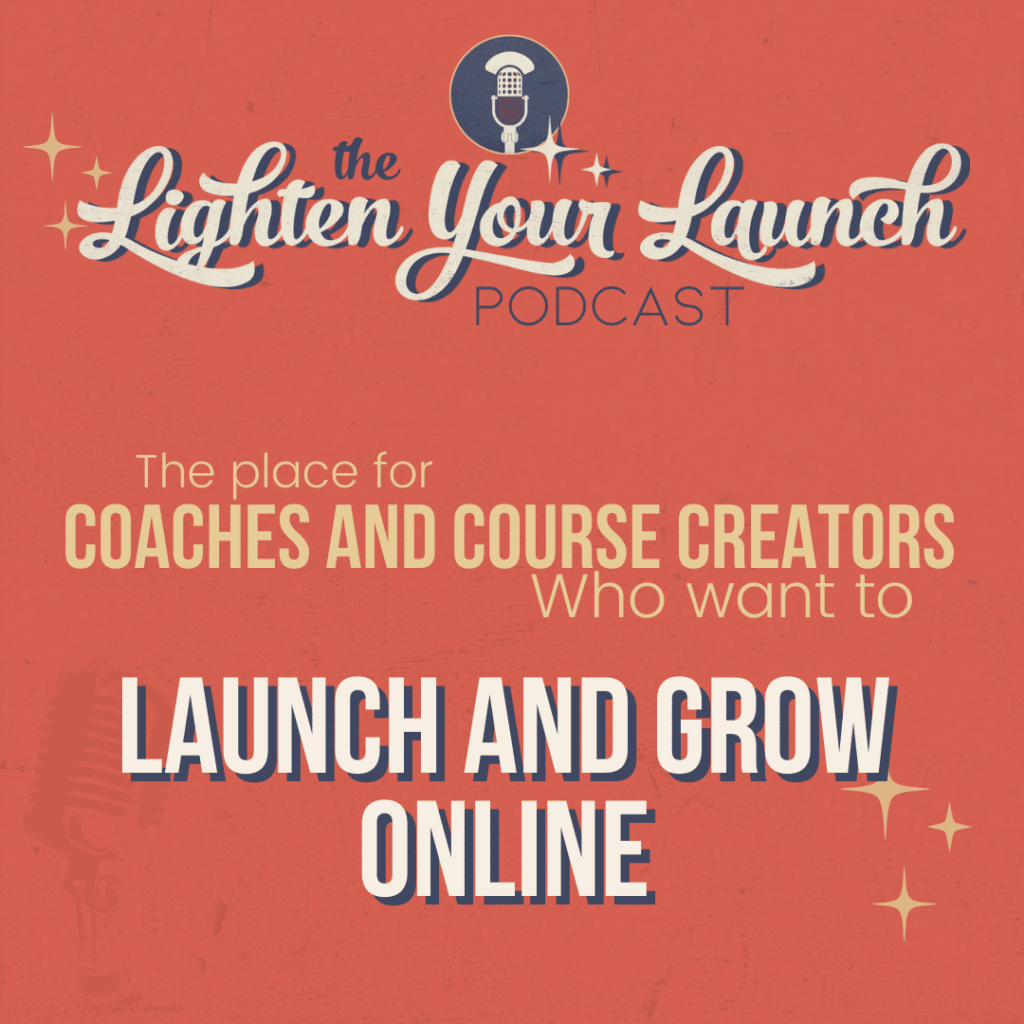
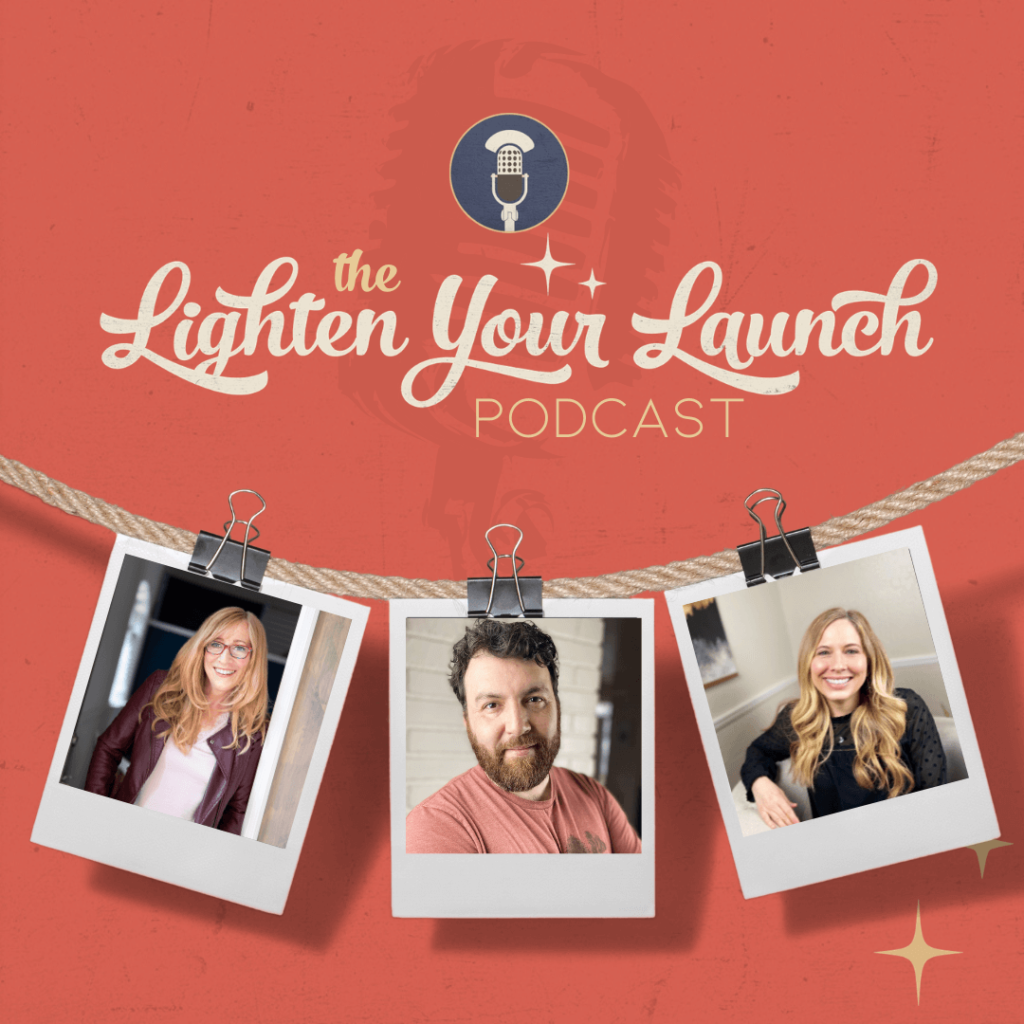


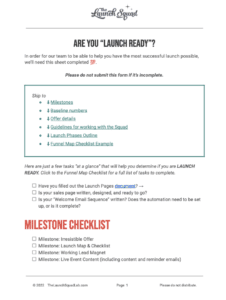
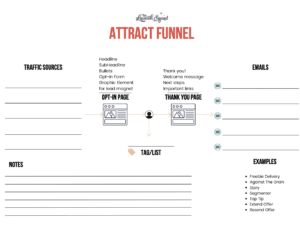
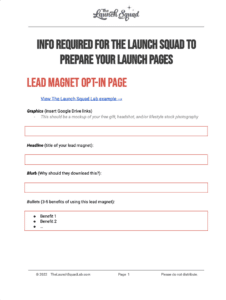
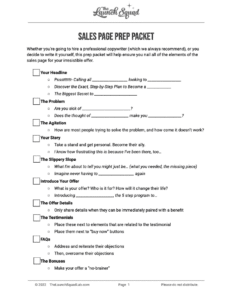
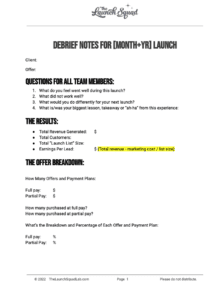
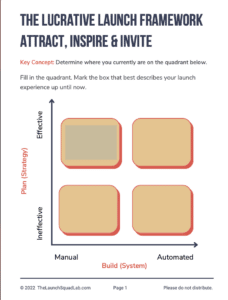
![Marketing Launch Calendar [TEMPLATE]](https://thelaunchsquadlab.com/wp-content/uploads/2023/05/Marketing-Launch-Calendar-TEMPLATE-300x260.png)
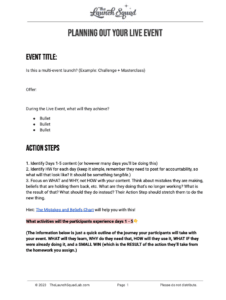

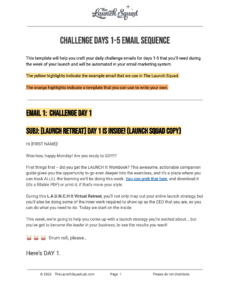
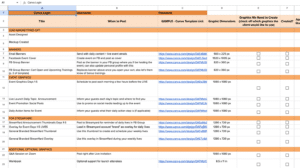
![[Updated] Email Templates for Launch](https://thelaunchsquadlab.com/wp-content/uploads/2023/05/Updated-Email-Templates-for-Launch-223x300.png)
![[REVISED] LS Pitch Script](https://thelaunchsquadlab.com/wp-content/uploads/2023/05/REVISED-LS-Pitch-Script-2023-226x300.png)

